What I Think Is Most Different And Most Striking About Sunrise On The Reaping Is How CYNICAL It Is. To
What I think is most different and most striking about Sunrise on the Reaping is how CYNICAL it is. To some extent we knew it was going to be. This is a midquel. That the reapings go on and the Hunger Games only ends 25 years later is a forgeon conclusion. We know nothing that happens here is going to work.
The book is about implicit submission, and why, with numbers on their side, the many submit to the few, even when the few are unjust. And it's because, the book seems to say, numbers aren't ENOUGH. the Newcomers alliance is much bigger than the Careers. They should be able to team up and defeat them easily. But they don't. Eighteen of them are killed outright, because the Careers have the strength, the skill and the training. And that's just that.
Plutarch asks why the tributes don't overwhelm the Peacekeepers during training, and Haymitch is rightfully outraged at the privilege of this question. Why don't they? Because they probably couldn't kill them all, and even if they could, what good would it do? It wouldn't stop the Hunger Games. It wouldn't change a thing. No one would even know about it outside that room, because the Capitol would change the narrative. Just like Katniss and the Star Squad can't REALLY take on the Capitol single handed and assassinate the president, the scrappy alliance of kids can't really do any real damage to the system the Capitol has in place. All they can do is choose if they want to die now or later. So why don't they, if there's no difference to them, as Plutarch asks. Because, as Snow puts it. Hope. The slight chance that one of them will come out of it. And, more cynically, the hope that if they are good tributes and obey, their families will be left alone. If they choose to rebel and choose to die now they guarantee retaliation against their families and perhaps their entire district. We see that even in the tributes that attack the Gamemakers in the arena. They rise up, they break that bond of implicit submission--and they die bloody for it.
Why don't they rebel? Because they don't have the privilege to lose.
Even Lenore Dove, the Joan of Arc of Twelve, fails to do any real damage or have any real effect. All she does is get herself a reputation for being a trouble maker, and eventually get herself killed. Was she killed as part of the retaliation against Haymitch, or was her punishment because she's a rebel, and that's what happens to rebels? (and Snow hates covey girls.) but she fails because she IS alone. She focuses on small, symbolic acts that do nothing, but that she hopes will rally the people to action.Unfortunately, the people of Twelve don't want their lives to get any worse, and they don't have the privilege of spending time and energy on revolution the way a teenager girl whose family doesn't need her income to survive does--sadly, Twelve will remain this way, in an uncanny valley where they're beaten down enough to need change, but not enough to have NOTHING to lose. They are not one of the districts that rise up. So acting alone does nothing, teaming up does nothing. How does one fight an enemy with better technology, better weapons, and better organization? Beetee's plan doesn't work out. Of course it doesn't. Could it ever? Was it just borne out of grief for his son? And even if it had, then what? What was the plan? Haymitch's poster gets edited away. The Newcomers fail. Lenore Dove dies. The most you can say is Haymitch himself becomes too important to kill, like Beetee, and Snow let him live to fight another day, but so destroyed that he no longer WANTS to.
So, then, what WORKS?
The answer is, quite cynically, Plutarch's version of the world. Numbers mean something, there are more of US than there are of THEM , but that isn't enough. You need weapons, you can't bring a knife to a gun fight, you need EVERYONE on your side. You need organization, not just a series of disconnected rebellions, and you need an Army, provided by Thirteen, as problematic as they are. The timing just needs to be right. And most crucially, what I think Plutarch and everyone involved here learned is that victory belongs to those who control the narrative. Those who control the flow of information and tell their story. And it's not Plutarch, for all his cameras and his propos and his idea behind The Mockingjay, who eventually does that well.
It's Haymitch.
Who learned to tell a story and sell a narrative with himself and the Newcomers. Who tried to paint his poster in the arena only to see it rewritten in front of him. Who won't make that mistake again. When it's time for the deciding factor in the revolution, it's Haymitch who creates the Mockingjay-- and is he also using Katniss and her image? Yes. but he at least sees Katniss and the human she is inside it, unlike Plutarch who hasn't changed much from the man who makes a grieving family do reshoots over and over so he can get his footage, while congratulating himself for letting Haymitch have his goodbye.
When Katniss sets off the spark twenty five years later, the world is ready. The work is in place. Plutarch, Haymitch, Beetee, everyone can say GO , and this time it'll work. So buckle in, and wait for the Long Game, even though only Plutarch really has the privilege to wait, the rest of them don't have a choice. It's cynical. It's awful. People die. The lone rebels and the plucky girls and the alliance depending on its numbers all fail. Plutarch motherfucking Heavensbee, the richest of the rich the privilegedest of the privileged, pulls off the revolution, takes the credit, and lives to see the end of it, without ever once examining his own privilege, and unpacking the fact that despite his head being on the right side of history, he's never managed to see the Districts as PEOPLE . (and you could argue, ANYONE as people. ) But it's just the only way.
But this book isn't the middle of the series. It's the end. How awful would it be to read if we didn't know that Katniss and the Mockingjay rebellion would eventually succeed. We know that despite the cynism of a failed revolution and all its players, that one day it WILL work out. This book is called sunrise on the Reaping....the sun rises on a world where this is inevitable. But one day it won't be.
More Posts from 1lostcass and Others
Reblog if you have read fan fiction better than some published books
Help me prove a point

MANIFEST
MANIFEST
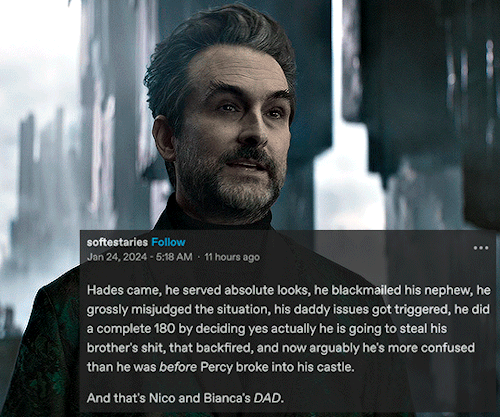
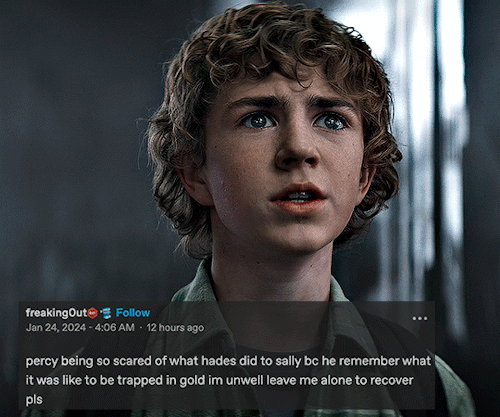
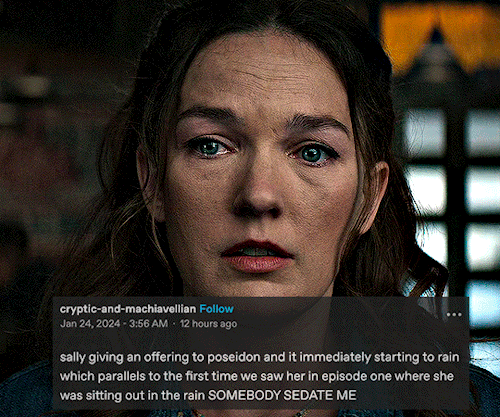
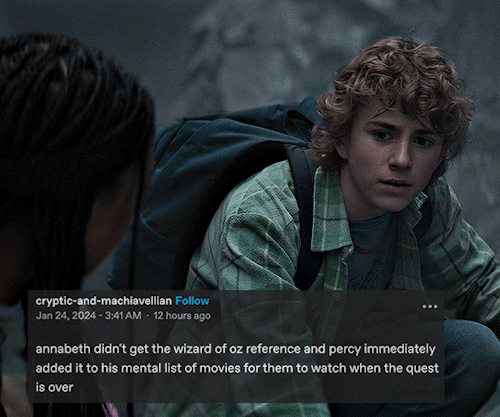

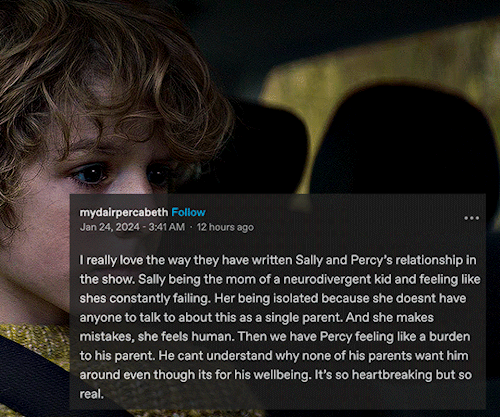

PERCY JACKSON AND THE OLYMPIANS (2023 - ) I 1.07 + Text posts
Dad Villain AU Masterpost
Main post! Context is here!
➼ Emelie is totally a good mom. I promise ➼ Mourning Morning. ➼ Tom and Nooroo (1) (2) (3) (4) ➼ Marinette meeting Nooroo, ➼ Nooroo Zooting the Fuck Out, And Zooting Further ➼ Marinette and Zoe (1) ➼ Luka meeting Marinette (1) (2) ➼ Marinette and Alya (1) ➼ Adrien speaking to Mother :D (1) (?) ➼ Adrien investigating the Timeline (1) (2) ➼ Adrien and Marinette meeting <3 / some adorable doting ➼ Adrien/Marinette hanging out (1) (2) (3) (animatic) ➼ Kim smackdown, Dealing with Lila/Chloe (1) (2) (3) ➼ Is That Jagged Fucking Stone??? (1) (2) (3) (4) ➼ Marinette's first episode (1) (2) (3) ➼ Get it, Nathalie. (1) ➼ Felix returns! (1) (?) ➼ Kagami returns! (?) ➼ The Fashion Show (1) (2) ➼ "The Charity Ball" (1) (2) (3) (4) (?) ➼ AU Ladybug, (additional shitpost) ➼ Viceroy attacking the shit out of Gabriel for my amusement (1) (2)
Propaganda in SOTR
An interesting facet of the way propaganda is used in SOTR is that the Capitol/Plutarch's manipulation of the footage happens gradually over the course of the Games in real time, which means people see multiple versions of the same events. Things are aired and then scrubbed, or else aired and then re-aired, slightly altered, until we get the edited cut that emerges during the Victory Ceremony recap. That 'final' edit succeeds in replacing the nation's collective memory of the Games, but it's important to note that plenty of citizens have, to varying degrees, witnessed parts of the truth!
For example, the footage from when the Games is airing "live" across Panem during mandatory viewing is not tampered with to nearly the same extent as the post-Games recap, both because:
1) the overarching 'narrative' of the Games inherently cannot be determined until the Games are finished and a Victor is named. Even the Gamemakers don't know exactly how the story's going to end. Things that might've seemed like normal gameplay (such as Haymitch and Ampert's initial meetup/alliance) likely air to the public before it becomes clear that what those two are actually up to is rebellious. When they begin to carry out their plot, certainly the cameras cut over to the other players, meaning none of the tank explosion gets shown, but only later would the Ampert & Haymitch alliance have been cut out completely.
2) The five or so minute delay is not long enough to make the kind of changes Haymitch describes watching during his Victor's Ceremony, and it is more likely that it only gives the Gamemakers/broadcasting crews enough lead time to determine which tributes they should be following at any given point of the Games (and when to cut away when someone is involved in something questionable). When the Careers and Haymitch and Maysilee encounter Gamemakers in the arena, for example, you can bet the footage airing across Panem shifts to Wellie in her tree. But later, when Haymitch tracks down Wellie and helps her, that's something that probably is shown at first, only to be erased later.
I'm thinking about this because I read a review where someone was saying this book opens up new plot holes for the original trilogy, because if they changed up Haymitch's games so much they could've just edited out Katniss and Peeta's suicide attempt and the berries altogether. I think it's a lot more complicated than that!
In her SOTR B&N edition interview, Suzanne even discusses how many versions of Haymitch's reaping exist and air to different people at different times. On the one hand you have what actually happens and is first filmed: The peacekeeper's shooting Woodbine, Lenore Dove helping Woodbine's mother, Haymitch's rigged 'reaping.' All of District 12 witnesses this, but the wider nation doesn't. Then you have the version that is aired to the rest of Panem after the 5 minute delay: Haymitch's name is called. No one reacts. Then you have the version Plutarch tweaks for the nightly recap: Sid and Ma are shown reacting to Haymitch's name being called. You then have the version shown during the Victor's Ceremony, post-games: Sid and Ma are scrubbed from the footage. And even then, finally, you get the version Katniss and Peeta watch on the train in Catching Fire, which Suzanne states could very well have been further tweaked over the years to fit an evolving narrative.
One can imagine this is true of many other elements of these Games. Capitol citizens directly witness both the Chariot Parade and the Interviews. Since the Interviews are also mandatory "live" viewing, nationwide, presumably the rest of Panem get much more extended footage of each tribute (with maybe just a couple of their answers cut by the 5 minute delay) than what is ultimately preserved on the tape Katniss & Peeta see. It's only after the games that the Newcomer alliance is all but erased.
The tributes' families are interviewed when there are eight kids remaining. Sid and Ma must've been interviewed back in Twelve, and surely that was shown. It's cut out, after, to make people forget about Haymitch's family. Similarly, the footage of Haymitch receiving the milk in the arena probably airs, because Snow's plan there is to force Haymitch to look like a terrible person (by dumping it when Wellie needed it), or force him to kill his ally (by giving Wellie the milk), or force him to kill himself (by drinking it), all of which needs to be seen to be effective. That entire plot line is cut from the recap footage because it goes nowhere, and no one who did see it probably thinks anything of it because it ends up not being important to Wellie's or Haymitch's death, but this doesn't erase that people did see it.
Ultimately, the point Suzanne's making re: propaganda isn't as simple as the nation being fed one (1) false version of events and believing it because it's the only thing they've ever been shown. It's that many citizens WITNESSED (to various degrees, depending on where and who they are) other versions of these Games, with more, though still not entirely truthful, elements from reality. Yet even though there are plenty of discrepancies for people to question, no one does. Haymitch even comments on this as he's watching the recap. The Capitol's gone so far as to have even changed up the order of the deaths (which wouldn't have been altered in the "live" footage for obvious reasons), and the Capitol audience is eating it up even though they MUST remember it didn't happen like that!! The propaganda, the final narrative, is so effective that it makes people forget even the truths they have seen with their own eyes. Reality gets buried under several layers of falsehood, not just the one. And no one asks any questions.
To bring it back around to Peeta and Katniss, their games and rebellion are harder to alter for several reasons. Some things do get cut, including what Katniss' does for Rue, in the recap. But The Finale is the one point of the games that to some degree needs to be shown in all versions. There's no one else left to cut away to, for one, and there also needs to be some sort of narrative ending to close the Games. It's harder to edit actual deaths, and harder still when it's down to the last two tributes remaining. (I'll point out here that the Capitol doesn't alter the force field trick in Haymitch's games, either, even though some people might have read rebellion even in that [Katniss and Peeta certainly do!] They really couldn't. This is why I think Haymitch's side plot to blow up the cornucopia and kill off Silka and likely himself in the process might have actually worked to cause a visible stark for the rebellion more than anything else that he does. To at least some degree, that would've had to have been shown. They would need it to explain the ending.)
Now, in a best case scenario, the Gamemakers certainly could've sent in a targeted mutt or something to take out Katniss or Peeta, and thus handpicked their singular Victor. But this idea is immediately foiled by the both of them very imminently killing themselves. This time, the Capitol does not have the benefit of time on their side, and the 5 minute delay in the footage makes not one ounce of difference.
Secondly, Katniss & Peeta have the added protection their personal narratives afford them. It's harder to erase Prim from all footage than it was Sid and Ma, because Katniss volunteering for Prim is The Fact about her everyone latches onto pre-Games. The desperate star-crossed lovers storyline, meanwhile, effectively makes the berry trick ambiguous, instead of inherently rebellious. Some might see it as an attack against the Capitol, but plenty more buy into the romance, and even Snow is forced to admit that this narrative can be useful in shifting the public sentiment. By that point in the books, the time for killing them has passed and it makes more sense for the Capitol to use Katniss & Peeta, just as by the end of SOTR, it makes more sense for the Capitol to use Haymitch to solidify their propaganda. Thus, Haymitch's story enhances Katniss and Peeta's, rather than tarnishes its believability. When propaganda works, it will have people believing what they are told above even their own memories. Katniss' ~luck~ comes from what Haymitch never had... a series of other events and people directly aligning with her actions to allow them to break through the Capitol's narrative.










Made a few more

bugsplaining..
While I'm working on my new stuff, here are some of my old works I haven't posted here.


Miraculous Mermay with Killer Orca Luka, and Marinette and Adrien as marine biologists.
Are you team Lukanette? Or Lukadrien? Or Lukadrienette? 👀
This AU gave me an idea for an original comic story which I hope I get the time to create in the future.
To follow up on this post, it would be so freaking funny if when Annabeth is telling Percy about Odysseus/the Odyssey, the screen cuts to an actual depiction of the narration, and Jay Herrans as Ody is like standing at the bow of the ship and pointing ahead and stuff and they're singing Full Speed Ahead. Cut back to Percabeth, and Percy's like, "...why are they singing?" I would p e r i s h
Writing Tips
Punctuating Dialogue
✧
➸ “This is a sentence.”
➸ “This is a sentence with a dialogue tag at the end,” she said.
➸ “This,” he said, “is a sentence split by a dialogue tag.”
➸ “This is a sentence,” she said. “This is a new sentence. New sentences are capitalized.”
➸ “This is a sentence followed by an action.” He stood. “They are separate sentences because he did not speak by standing.”
➸ She said, “Use a comma to introduce dialogue. The quote is capitalized when the dialogue tag is at the beginning.”
➸ “Use a comma when a dialogue tag follows a quote,” he said.
“Unless there is a question mark?” she asked.
“Or an exclamation point!” he answered. “The dialogue tag still remains uncapitalized because it’s not truly the end of the sentence.”
➸ “Periods and commas should be inside closing quotations.”
➸ “Hey!” she shouted, “Sometimes exclamation points are inside quotations.”
However, if it’s not dialogue exclamation points can also be “outside”!
➸ “Does this apply to question marks too?” he asked.
If it’s not dialogue, can question marks be “outside”? (Yes, they can.)
➸ “This applies to dashes too. Inside quotations dashes typically express—“
“Interruption” — but there are situations dashes may be outside.
➸ “You’ll notice that exclamation marks, question marks, and dashes do not have a comma after them. Ellipses don’t have a comma after them either…” she said.
➸ “My teacher said, ‘Use single quotation marks when quoting within dialogue.’”
➸ “Use paragraph breaks to indicate a new speaker,” he said.
“The readers will know it’s someone else speaking.”
➸ “If it’s the same speaker but different paragraph, keep the closing quotation off.
“This shows it’s the same character continuing to speak.”
-
 begiuls liked this · 1 month ago
begiuls liked this · 1 month ago -
 little-flower-mouse liked this · 1 month ago
little-flower-mouse liked this · 1 month ago -
 small-boat liked this · 1 month ago
small-boat liked this · 1 month ago -
 bianca5756 liked this · 1 month ago
bianca5756 liked this · 1 month ago -
 myunhealthyobsessionoftheweek liked this · 1 month ago
myunhealthyobsessionoftheweek liked this · 1 month ago -
 milflewis liked this · 1 month ago
milflewis liked this · 1 month ago -
 nephritemoro88 liked this · 1 month ago
nephritemoro88 liked this · 1 month ago -
 crusherccme liked this · 1 month ago
crusherccme liked this · 1 month ago -
 tallulah-banks reblogged this · 1 month ago
tallulah-banks reblogged this · 1 month ago -
 josefinacleopanda reblogged this · 1 month ago
josefinacleopanda reblogged this · 1 month ago -
 josefinacleopanda liked this · 1 month ago
josefinacleopanda liked this · 1 month ago -
 iwanttolearnitall reblogged this · 1 month ago
iwanttolearnitall reblogged this · 1 month ago -
 i-need-of-a-hobby reblogged this · 1 month ago
i-need-of-a-hobby reblogged this · 1 month ago -
 crescentsets reblogged this · 1 month ago
crescentsets reblogged this · 1 month ago -
 ceruleandust liked this · 1 month ago
ceruleandust liked this · 1 month ago -
 georgiawarrs liked this · 1 month ago
georgiawarrs liked this · 1 month ago -
 bi-streetcat reblogged this · 1 month ago
bi-streetcat reblogged this · 1 month ago -
 bi-streetcat liked this · 1 month ago
bi-streetcat liked this · 1 month ago -
 alwaysbethisclose liked this · 1 month ago
alwaysbethisclose liked this · 1 month ago -
 cheiade100 liked this · 1 month ago
cheiade100 liked this · 1 month ago -
 sldlovescartoons liked this · 1 month ago
sldlovescartoons liked this · 1 month ago -
 rosemary-for-remembrance liked this · 1 month ago
rosemary-for-remembrance liked this · 1 month ago -
 autism-criminal liked this · 1 month ago
autism-criminal liked this · 1 month ago -
 kiera-earth-616 reblogged this · 1 month ago
kiera-earth-616 reblogged this · 1 month ago -
 kiera-earth-616 liked this · 1 month ago
kiera-earth-616 liked this · 1 month ago -
 danielalalalala88 liked this · 1 month ago
danielalalalala88 liked this · 1 month ago -
 briefarcadelove liked this · 1 month ago
briefarcadelove liked this · 1 month ago -
 carrowsgirl liked this · 1 month ago
carrowsgirl liked this · 1 month ago -
 fantasyfrogmushroomhat reblogged this · 1 month ago
fantasyfrogmushroomhat reblogged this · 1 month ago -
 fantasyfrogmushroomhat liked this · 1 month ago
fantasyfrogmushroomhat liked this · 1 month ago -
 lowqualityzaza liked this · 1 month ago
lowqualityzaza liked this · 1 month ago -
 rellaatmidnight liked this · 1 month ago
rellaatmidnight liked this · 1 month ago -
 saanhj-ilostmyfuckingpassword liked this · 1 month ago
saanhj-ilostmyfuckingpassword liked this · 1 month ago -
 wondereyesmotionhigh liked this · 1 month ago
wondereyesmotionhigh liked this · 1 month ago -
 sweetbutpsycho61 liked this · 1 month ago
sweetbutpsycho61 liked this · 1 month ago -
 quicksilvermaid liked this · 1 month ago
quicksilvermaid liked this · 1 month ago -
 burnt-toast661 reblogged this · 1 month ago
burnt-toast661 reblogged this · 1 month ago -
 burnt-toast661 liked this · 1 month ago
burnt-toast661 liked this · 1 month ago -
 lucylenoredovegray reblogged this · 1 month ago
lucylenoredovegray reblogged this · 1 month ago -
 beepboopwhoops liked this · 1 month ago
beepboopwhoops liked this · 1 month ago -
 paoconcafe liked this · 1 month ago
paoconcafe liked this · 1 month ago -
 ohhumbleoddity reblogged this · 1 month ago
ohhumbleoddity reblogged this · 1 month ago -
 ohhumbleoddity liked this · 1 month ago
ohhumbleoddity liked this · 1 month ago -
 marigoldsgwentcard liked this · 1 month ago
marigoldsgwentcard liked this · 1 month ago -
 erdrea liked this · 1 month ago
erdrea liked this · 1 month ago -
 lil-lunchbox liked this · 1 month ago
lil-lunchbox liked this · 1 month ago -
 cel-14 liked this · 1 month ago
cel-14 liked this · 1 month ago -
 pirates-eat-vegetables liked this · 1 month ago
pirates-eat-vegetables liked this · 1 month ago
Hallo, I'm Karla and here everything is either art, head canons or shit posts.
39 posts